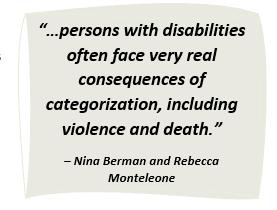A Novel Approach
by Lauren Blair
Posted on June 21, 2022
A new publication highlights how Kupenda’s disability trainings are changing negative perceptions about the causes of disability and helping to reduce the use of harmful practices to treat people with disabilities.
At the end of May, Kupenda had the honor of having its work published in a book entitled “Disability and Social Justice in Kenya.” The collection, edited by Nina Berman and Rebecca Monteleone, includes a chapter about Kupenda’s work with stigma and culture. In this section, Kupenda’s Executive Director, Kenyan Director, and Development Director, discuss the organization’s success in changing negative cultural perceptions about disability by empowering local leaders as disability advocates.
About the Book
This book represents one of the first interdisciplinary studies by scholars, activists, and policymakers to explore achievements and challenges for people with disabilities in a specific part of Africa. According to the editors,
“Both the historical and contemporary experience of disability in Kenya remain largely unwritten,” despite the fact that “those identified or identifying as persons with disabilities often face very real consequences of categorization, including violence and death.”
About Kupenda’s Chapter
Kupenda’s chapter examines our Disability Advocacy Workshops, which are tailored for different groups of influential community leaders such as pastors, traditional healers, government leaders, and families. It also discusses the workshops’ effectiveness in equipping these leaders to help mitigate challenges faced by people with disabilities in their communities.
A two-year evaluation showed that 73% of the participants believed disabilities were caused by spiritual factors (i.e., curses, witchcraft, sin, etc.) before attending one of these workshops. By the end of the workshop, however, 60% of those same participants believed in medical causes for disability such as genetics, accidents, birth trauma, etc.
In addition to changing beliefs, participants were also spurred on to action. Kupenda documented that 73% of workshop participants went on to advocate for and assist families impacted by disabilities in their communities through counseling, care and referrals.
These workshops continue to serve as an effective model for helping others promote justice and inclusion for populations affected by disability throughout the world.
Why It Matters
By hosting workshops, engaging in conversations, and participating in studies about disabilities, we not only learn more about the population of people that we are trying to assist, but we are better equipped to restore dignity and worth where it may be displaced. According to Kimani Njogu, Executive Director of the Kenyan organization, Twaweza Communications,
“Disability concerns are not just about impairment or functional limitations; rather, they are at the core of power relations and what is considered ‘valuable’ in society.”
Your support of Kupenda places value on people who are vulnerable. We hope you will choose to investigate this issue, as well as Kupenda’s work and impact, by exploring this publication further.
There is a Swahili proverb that states, “Firebrand upon firebrand keeps the fire burning.” According to Berman and Monteleone, continual grassroots advocacy efforts towards people with disabilities is what creates a robust disability rights movement.
With your assistance, we can empower people with disabilities to reach their full potential and keep the fire burning!
Order your copy of “Disability and Social Justice” in Kenya here.
Want to keep updated on Kupenda’s work?
You can follow us on Facebook, Instagram, LinkedIn, and Twitter.
And please also sign up for our monthly newsletter and updates here.
If you’re interested in supporting one of the many children we serve, head over to our
sponsorship page to learn about how you can make a difference for just $30 / month.
You can also help children with disabilities stay safe and healthy during COVID-19 by donating here.



Leave a Reply